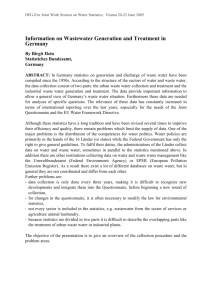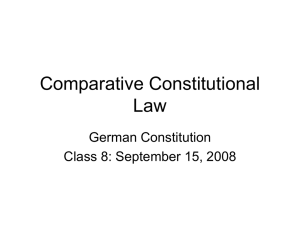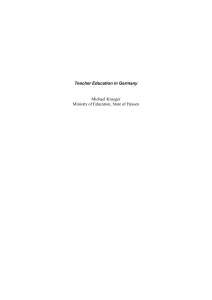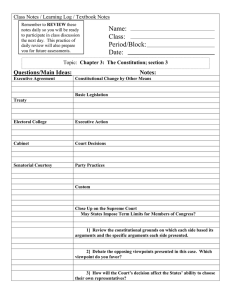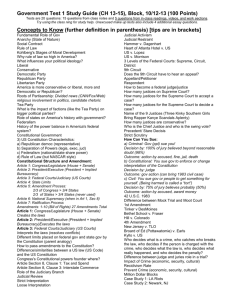P L Constitutional Drift: Toward the End of Federal Shop-
advertisement
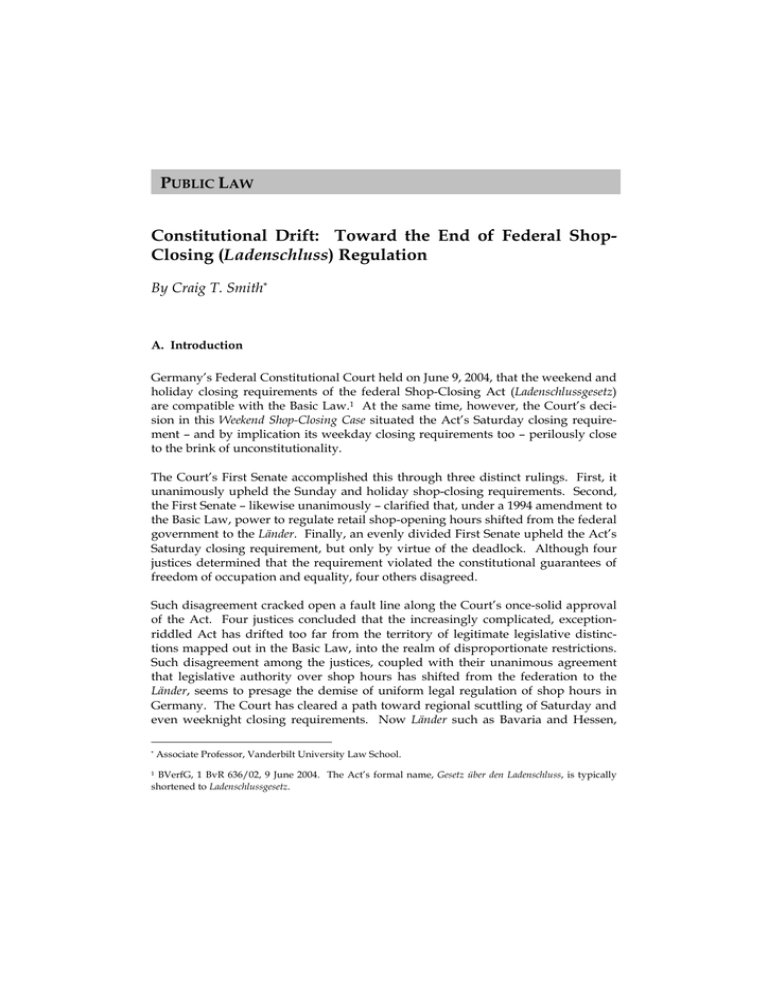
PUBLIC LAW Constitutional Drift: Toward the End of Federal ShopClosing (Ladenschluss) Regulation By Craig T. Smith* A. Introduction Germany’s Federal Constitutional Court held on June 9, 2004, that the weekend and holiday closing requirements of the federal Shop-Closing Act (Ladenschlussgesetz) are compatible with the Basic Law.1 At the same time, however, the Court’s decision in this Weekend Shop-Closing Case situated the Act’s Saturday closing requirement – and by implication its weekday closing requirements too – perilously close to the brink of unconstitutionality. The Court’s First Senate accomplished this through three distinct rulings. First, it unanimously upheld the Sunday and holiday shop-closing requirements. Second, the First Senate – likewise unanimously – clarified that, under a 1994 amendment to the Basic Law, power to regulate retail shop-opening hours shifted from the federal government to the Länder. Finally, an evenly divided First Senate upheld the Act’s Saturday closing requirement, but only by virtue of the deadlock. Although four justices determined that the requirement violated the constitutional guarantees of freedom of occupation and equality, four others disagreed. Such disagreement cracked open a fault line along the Court’s once-solid approval of the Act. Four justices concluded that the increasingly complicated, exceptionriddled Act has drifted too far from the territory of legitimate legislative distinctions mapped out in the Basic Law, into the realm of disproportionate restrictions. Such disagreement among the justices, coupled with their unanimous agreement that legislative authority over shop hours has shifted from the federation to the Länder, seems to presage the demise of uniform legal regulation of shop hours in Germany. The Court has cleared a path toward regional scuttling of Saturday and even weeknight closing requirements. Now Länder such as Bavaria and Hessen, * Associate Professor, Vanderbilt University Law School. BVerfG, 1 BvR 636/02, 9 June 2004. The Act’s formal name, Gesetz über den Ladenschluss, is typically shortened to Ladenschlussgesetz. 1 1032 GERMAN LAW JOURNAL [Vol. 05 No. 09 whose leaders have expressed eagerness to increase the autonomy of retail shop owners,2 seem prepared to travel that path. Change appears to be coming. This article will analyze the Court’s decision in three parts. The first part uses a brief history of the Shop-Closing Act and controversy surrounding it to place the Court’s decision in a general context. The second part is more specifically contextual; it describes the quite deliberate and open provocation of a constitutional dispute by the large Kaufhof department store in central Berlin. Finally, close analysis of the Constitutional Court’s 9 June 2004 decision yields insights regarding the Court’s rhetoric, its prevailing views regarding federalism, and the various justices’ competing concepts of proportionality in the realms of equality and freedom of occupation. B. A Century of Debate, Amendment, and Legal Challenges Regulation of retail store hours has long been a controversial topic in Germany. The issue of whether to permit retail shops to do business on evenings, Sundays, and holidays has been debated for decades in Germany’s commercial, labor, religious, political, and legal communities. In 1891, Germany enacted a requirement that retail shops close on Sundays and holidays.3 In 1900, an amendment extended shop closure to the night, from 9 p.m. through 5 a.m.4 Various amendments and executive-branch overlays between 1919 and 1943 complicated the picture. Following World War II, further complications arose when, during the Federal Republic’s first two years, the young Länder of Baden and Bremen enacted regional statutes that were inconsistent with the pre-existing and arguably still-valid shop-hours regulation.5 The Federal Constitutional Court sorted out this messy situation in May 1952.6 In one of its first major decisions, the Court invalidated the Länder statutes. It held that the shop-closing requirements as of 1939 had, by virtue of the 1949 Basic Law, become federal law. Moreover, the Court added, the requirements comprehen- Wirtschaft, Recht, & Steuer, Neuregelung des Ladenschlusses ist Ländersache, FRANKFURTER ALLGEMEINE ZEITUNG, 16 June 2004, at 25 [hereinafter “FAZ”]. 2 Shop-Closing II, 1 BvR 760/57, 29 November 1961, BVerfGE 13, 237 (240) (citing the Act to Amend the Commercial Order (Gesetz betreffend Abänderung der Gewerbeordnung), 1 June 1891, RGBl. At 261). 3 4 Id. at 321. 5 Id. 6 Shop-Closing I, 1 BvL 3/51 & 4/51, 20 May 1952, BVerfGE 1, 283. 2004] Toward the End of Federal Shop-Closing Regulation 1033 sively regulated the legislative subject-matter of shop hours, thereby leaving no residual authority for the Länder to shorten shop hours further.7 That decision left the Federal Republic saddled with requirements that lacked the democratic legitimization enjoyed by statutes enacted under the Basic Law. A truly federal Shop-Closing Act – that is, one promulgated by the Federal Republic’s legislative branch – followed in 1956.8 It generally permitted shops to open only during daytime and early evening hours on weekdays and, to a lesser extent, on Saturdays.9 The Act’s primary purpose, the Federal Constitutional Court later explained, is to protect employees in retail shops (Einzelhandel) by effecting “an employeefriendly distribution of work hours” mainly on weekdays.10 Secondarily, the Act also aimed to secure fair competition (Wettbewerbsneutralität),11 that is, an “equality of opportunity,” by prohibiting one competitor from outbidding another with “inordinately long” hours.12 The Act was soon challenged. In 1961, the Federal Constitutional Court upheld it, rejecting a bookseller’s constitutional complaint that was supported by a report from the famous and controversial constitutional expert, Professor Theodor Maunz.13 The Court declared that the Act was a proper exercise of federal concurrent power.14 The Court also held that the Act did not violate constitutionally guaranteed freedom of occupation. The Act regulated the practice, rather than choice, of an occupation, the Court explained, and the shop-closing requirements it imposed were not overly onerous and were supported by “reasonable publicwelfare considerations” (vernünftige Erwägungen des Gemeinwohls).15 Finally, the 7 Id. at 293-99. 8 Shop-Closing Act (Gesetz über den Ladenschluss), 28 November 1956, BGBl. I at 875. 9 BVerfG, 1 BvR 636/02, 9 June 2004, § A.I. BVerfG, 1 BvR 1236/99, 16 January 2002, 12, available at http://www.bundesverfassungsgericht.de (last visited on 27 July 2004) (citing Hufen, NJW 1986, p. 1291 at 1298). The quoted phrase is in German “eine arbeitnehmerfreundliche Verteilung der Arbeitszeit”). 10 11 Id. 12 BVerfG, 1 BvR 698, 771-79, 9 February 1982, BVerfGE 59, 336 (354). 13 Shop-Closing II, 1 BvR 760/57, 29 November 1961, BVerfGE 13, 237 at 238. See also Markus Dirk Dubber, “Michael Stolleis, The Law under the Swastika: Studies on Legal History in Nazi Germany,” 18 Law & Hist. Rev. 226, 227 (2000) (book review) (noting that Professor Maunz wrote “both the definitive commentary and textbook on the Basic Law” but also remained “a diehard Nazi”). 14 15 Shop-Closing II, 1 BvR 760/57, 29 November 1961, BVerfGE 13, 237 at 239. Id. at 240-41. 1034 GERMAN LAW JOURNAL [Vol. 05 No. 09 Court likewise held that the Act did not violate constitutionally guaranteed equality. The Court identified two reasons for this: (1) a bookshop is not sufficiently differentiated from other types of shops and (2) the Court would hopelessly muddle the Act if it were to mandate exemption of bookshops on grounds that likewise seem applicable to, for example, music, art, and even department stores.16 Since 1961, amendments and other legal challenges loosened restrictions but also complicated the regulatory scheme by adding numerous exemptions.17 Longer shop hours were authorized on weekdays, more and longer Saturday openings were permitted, and exceptions for Sundays and holidays were added. Challenges to the evolving Act engaged Germany’s supreme federal courts several times. For example, on several occasions the Federal Administrative Court emphasized that the Act’s Section 23, which permits the Länder to authorize certain temporary exceptions to the shop-closing requirements, must be narrowly interpreted.18 Similarly, in 1993 the Federal Administrative Court interpreted the Act as implicitly authorizing for gas stations the same exceptions expressly granted to other travel-related shops such as those at train stations and airports.19 In addition, in 1982 the Federal Constitutional Court reversed the Federal Administrative Court, ruling that barber shops, whom the Shop-Closing Act treated more liberally than other shops, had more freedom to choose their opening hours than the Administrative Court had acknowledged.20 More recently, in 2002, the Constitutional Court invalidated the explicit exclusion of apothecaries from the Act’s list of businesses authorized to open on as many as four Sundays or holidays per year.21 The exclusion, the Court reasoned, was a disproportionate restriction of the freedom of occupation guaranteed by the Basic Law’s Article 12.22 16 Id. at 242-43. 17 See generally, Der Streit um den Ladenschluss, at http://www.tu-dresden.de/jfoeffl4/OeRimWWW/ OeRAktuell.html (last visited 27 July 2004) (information compiled by Prof. Dr. Jochen Rozek, Technische Universität Dresden). 18 E.g., BVerwGE 65, 167, No. 1 C 157/79, 23 March 1982 (citing BVerwG 1 C 43.775, 5 February 1980). 19 Politik, Tankstellen dürfen nach Ladenschluss Reisebedarf verkaufen, FAZ, 27 October 1993 at 1; Wirtschaft, Mineralölwirtschaft erfreut über Urteil zum Tankstellenverkauf, FAZ, 3 November 1993 at 24. 20 BVerfG 1 BvR 698, 771-79, 9 February 1982, BVerfGE 59, 336. BVerfG, 1 BvR 1236/99, 16 January 2002, available at http://www.bundesverfassungsgericht.de (last visited on 27 July 2004). See also Constitutional Standards, Working Time and Pharmacy Opening Hours: The FCC's Message to Managers and Law Makers, 3 GERMAN L.J. No. 3 (1 March 2002), at http://www.germanlawjournal.com/article.php?id=136. 21 BVerfG, 1 BvR 1236/99, 16 January 2002, available at http://www.bundesverfassungsgericht.de (last visited on 27 July 2004). 22 2004] Toward the End of Federal Shop-Closing Regulation 1035 After reunification, particularly in Berlin and the new Länder during the late 1990s, debate over the Shop-Closing Act increased.23 More small shop owners began calling for liberalization, and some Länder grew bolder, authorizing regional exceptions whose legality was questionable.24 By May 2003, when amendments brought the Act to its current form, the mandatory shop-closing period had shrunk by 20% on weekdays (from 12.5 hours in 1956 to 10 hours) and by over 40% on most Saturdays (from 17 hours in 1956 for all Saturdays except the first one of each month to 10 hours).25 In addition, by 2003 the Act authorized longer opening hours for apothecaries, gas stations, newspaper and magazine sellers, and shops at train stations, airports, and resorts.26 Nonetheless, some commentators asked how long the Act could survive the increasing pressure to liberalize regulation of shop hours.27 Others openly predicted the Act’s demise.28 A final background point worth noting concerns the intersection of the debate over shop hours with debate over federalism. The Constitutional Court issued its 9 June 2004 decision against a backdrop of two related, post-reunification efforts to reform Germany’s distribution of federal and Land powers. First, in 1994, Germany sought to strengthen the Länder parliaments, in compensation for the diminution in legislative power they had suffered since 1949, by amending Article 72(2) and creating Article 125a of the Basic Law.29 Article 72(2) addresses “concurrent” legislative powers, meaning those shared by the federation and the Länder. The amendment of Article 72(2) conditioned the federation’s right to use its concurrent power on a heightened need for uniform national regulation.30 As explained below, this amendment would later affect the Constitutional Court’s Weekend Shop-Closing decision. 23 Dietmar Hipp, et al., Kampf um den Sonntag, DER SPIEGEL, No. 32, 9 August 1999 at 22.; Joachim Hirzel, et al., Ladenschluss: Das letzte Tabu, FOCUS, No. 32, 9 August 1999 at 16. Wirtschaft, Niedersachsen erlaubt längere Ladenöffnung, FAZ, Oct. 22, 1999, at 22. See generally, Der Streit um den Ladenschluss, at http://www.tu-dresden.de/jfoeffl4/OeRimWWW/OeRAktuell.html (last visited 27 July 2004) (information compiled by Prof. Dr. Jochen Rozek, Technische Universität Dresden). 24 25 BVerfG, 1 BvR 636/02, 9 June 2004, § A.I (citing BGBl I p. 875 and the Shop-Closing Act § 3(1)). 26 Shop-Closing Act §§ 4-10. 27 28 Kai Pfundt, Ladenschluss: Wie Lange Noch?, GENERAL-ANZEIGER (Bonn), Politik, 17 January 2002 at 1. Diethard Weichmann, Pyrrhussieg für Ladenschluss, LEBENSMITTEL ZEITUNG, 11 June 2004 at 2. BVerfG, 1 BvR 636/02, 9 June 2004, § B.I.a)(bb)(3); HANS D. JARASS & BODO PIEROTH, GRUNDGESETZ KOMMENTAR, ART. 72, NOTE 1 (4th ed. 1997), (citing BT-Drucksache 12/6000 at 32). 29 30 HANS D. JARASS & BODO PIEROTH, GRUNDGESETZ KOMMENTAR, ART. 72, NOTE 7 (4th ed. 1997). 1036 GERMAN LAW JOURNAL [Vol. 05 No. 09 Second, because the 1994 changes left the Länder unsatisfied, in October 2003 the two houses of Germany’s parliament created the Joint Bundestag-Bundesrat Commission on Modernizing the Federal Order.31 Its task is to recommend, by the end of 2004, “modernization” of German federalism aimed at “improving the ability of the federation and Länder to act and to decide”; “delineating political responsibilities more clearly”; and “enhancing the appropriateness [Zweckmäßigkeit] and efficiency with which tasks are fulfilled.”32 The Constitutional Court’s Weekend Shop-Closing decision, therefore, arrived a decade after an unsatisfying federalism reform and coincided with the federalism commission’s deliberations. This timing likewise may have had significance for the Court. Certainly some politicians interpreted the Court’s decision as a contribution to the Commission’s work.33 Moreover, rulings such as the First Senate’s Dangerous Dogs decision of 16 March 200434 and the subsequent Juniorprofessor decision of 27 July 2004 by the Court’s Second Senate confirmed that currently the justices are keenly interested in distinguishing federal from Länder competences.35 In that ruling the Court voided a 2002 amendment to the federal Higher Education Framework Act (Hochschulrahmengesetz) because the amendment exceeded the limits of federal authority.36 31 Bundestag, Formation Decrees, Joint Bundestag-Bundesrat Commission on Modernizing the Federal Order, 16 October 2003, BT-Drucksache 15/1685, at http://www1.bundesrat.de/Site/Inhalt/ DE/1_20Aktuelles/1.1_20Bundesstaatskommission/HI/Bundesstaatskommission.html (last visited 27 July 2004). 32 Id. at § 2. 33 Wirtschaft Clement: Der Ladenschluß wird künftig Sache der Länder sein, FAZ, 11 June 2004, at 13.; Wirtschaft, Länder ohne gemeinsame Linie für neuen Ladenschluss, DEUTSCHE PRESSE-AGENTUR -EUROPADIENST, 11 June 2004, available at http://www.lexis.com/ (visited 2 August 2004). 34 BVerfG, 1 BvR 1778/01, 16 March 2004. 35 BVerfG, 2 BvF 2/02, 27 July 2004 (voiding the Fünfte Gesetz zur Änderung des Hochschulrahmengesetzes und anderer Vorschriften (5. HRGÄndG) of 16 February 2002, BGBl I at 693). See also Frieder Dünkel & Dirk van Zyl Smit, Preventive Detention of Dangerous Offenders Re-examined: A Comment on Two Decisions of the German Federal Constitutional Court, 5 GERMAN L.J. No. 6 (1 June 2004), available at http://www.germanlawjournal.com/article.php?id=453 (analyzing another recent federalism ruling by the Court). 36 Id. 2004] Toward the End of Federal Shop-Closing Regulation 1037 C. The Dispute The lively political and legal debates over the Shop-Closing Act help explain the genesis of the Weekend Shop-Closing Case. The dispute arose from a carefully planned and marketed challenge by the large Kaufhof department-store chain, which employs some 27,000 people at its stores in Germany and Belgium.37 One of the chain’s top managers, Günter Biere, unabashedly provoked a legal battle in a manner that earned him headlines as the “Shop-Closing Rambo” and “Sunday Rebel”: He perpetrated an “Etiketten-Schwindel” (label fraud) in the center of Berlin.38 In the 20,000-square-meter shopping space of the Kaufhof located on Berlin’s Alexanderplatz, Biere used over half a million labels to mark all the items sold after normal weekend shop hours as “Berlin Souvenirs.”39 This, he claimed, gave Kaufhof as much right to open on Saturday nights and Sundays in Berlin’s “tourist zone” as postcard peddlers in the nearby train station.40 Nationwide notoriety and tremendous sales followed.41 What also followed, of course, was litigation. A nearby shop sued, obtaining an injunction that survived an appeal in the administrative courts.42 The Berlin courts enjoined the Kaufhof from doing business on Sundays and from remaining open past 4 p.m. on Saturdays. The Berlin Kammergericht held that the Shop-Closing Act prevented the department store’s sale of bogus “souvenirs.” The Kammergericht further held that the Act did not violate the Basic Law because the shop-hour restrictions proportionately limited occupational freedom without effecting arbitrary discrimination.43 Hirzel, supra note 23; Kurzporträt Kaufhhof Warenhaus AG, at http://www.galeriakaufhof.de/sales/coco/co_unternehmen_011_kurzportrait.asp?FLEXID=0 (last visited July 28, 2004). 37 38 Hirzel, supra note 23; Christoph Seils, Porträt: Umtriebig, Frankfurter Rundschau, THEMA DES TAGES, June 2004 at 29. 39 Hirzel, supra note 23. 40 Hipp, supra note 23. 41 Id. 42 BVerfG, 1 BvR 636/02, 9 June 2004, § A.II. 43 Id. 1038 GERMAN LAW JOURNAL [Vol. 05 No. 09 D. The Federal Constitutional Court’s Opinion The Constitutional Court affirmed the decision of the Kammergericht. The Court did so, moreover, by writing a thought-provoking and rhetorically intriguing opinion. The result is a masterful compromise that both focuses and prompts political debate. I. Substantively Focusing Political Debate Substantively, the Constitutional Court’s opinion presents an admirable compromise that focuses future political debate. On the one hand, the result promotes conservative judicial restraint in the best sense. It refuses to forbid, by judicial decree, a practice that the Federal Republic’s legislators, acting under close public scrutiny in a prominent and much-debated realm, have created, refined, and upheld for nearly half a century. On the other hand, the decision spurs and focuses future political debate. It does so by making four statements that form a collectively coherent and constructive contribution to longstanding debates of immense practical significance. The first two statements question the political choice to regulate shop hours at the federal level: 1. The Basic Law does not require federal regulation of shop hours. Neither economic unity nor labor concerns suggest need for a uniform federal solution. To the contrary, the federal legislature has suggested otherwise by empowering the Länder to enact certain shop-closing exceptions.44 2. Consequently, the legislature now must examine whether authority over shop hours should be delegated to the Länder, which enjoy concurrent legislative power under Article 74 of the Basic Law.45 44 Id. at §§ B.I.1.a).aa) & B.I.1.b).dd).(2)(a)(ee). 45 Id. § B.I.1.b).dd)(2)(a)(ee). 2004] Toward the End of Federal Shop-Closing Regulation 1039 Viewed in the context of prominent, numerous calls for regional autonomy and differentiation with respect to shop hours, these statements seem to invite delegation of this subject matter to the Länder. The third statement provides another incentive for federal legislators to abandon the realm of shop-hours regulation: 3. The number of justices who accept the Saturday closing requirement’s constitutionality is equaled by those who see in it a violation of fundamental rights. This statement makes manifest that the Act might not survive future challenges. Amendments to the Act, for example additional exceptions, or even the appointment of a single new justice, could result in judicial nullification. Collectively, therefore, these three statements effect a jurisprudential equivalent of a shot across the bow in naval military strategy: an act that leaves the ship afloat but warns of an imminent sinking if the course remains unchanged. Moreover, the statements explicitly propose to the federal government a course change: Move away from federal regulation, and let the Länder steer new, possibly diverse courses. Finally, the Court’s fourth statement should, by contrast, dampen political debate regarding Sundays and holidays and focus it instead on other days: 4. The Sunday and holiday closing requirements are constitutional. They do not violate either freedom of occupation or equality. First, Article 140 of the Basic Law, by incorporating Article 139 of the Weimar Constitution, expressly protects Sundays and holidays as “days of rest,” 46 thereby limiting freedom of occupation or equality. Second, Article 140 requires statutory specification of how to protect at least the inviolable core aspects 46 Art. 140 GG. The incorporated provision states: “Sunday and the public holidays recognized by the state remain legally protected as days of rest from work and of spiritual edification.” Art. 139 WRV, translated in AXEL TSCHENTSCHER, THE BASIC LAW (GRUNDGESETZ): THE CONSTITUTION OF THE FEDERAL REPUBLIC OF GERMANY 106 (Jurisprudentia, 2002-2003), available at http://www.jurisprudentia.de /jurisprudentia.html (last visited July 9, 2004). 1040 GERMAN LAW JOURNAL [Vol. 05 No. 09 of Sunday and holiday rest.47 Third, the ShopClosing Act’s Sunday and holiday closing requirements properly do so.48 This final statement may be read as a “hands-off” warning. It not only leaves the Sunday and holiday requirement intact, but it also implies that failure to mandate shop closure on such days might well equal failure to effect constitutionally required protection of days of rest. II. Rhetorically Prompting Political Debate In terms of judicial rhetoric, too, the Court’s opinion enhances the force of its collective compromise and effectively prompts further political debate. Two key rhetorical – more specifically organizational – tactics helped the divided First Senate conservatively retain the status quo yet also progressively invite reform: (1) emphasizing federalism rather than protection of Sundays and holidays; and (2) downplaying discord among the justices by integrating the prevailing and dissenting views into a unified, integrated opinion. a) Emphasizing Federalism The first organizational tactic is withholding, until the end of the opinion, analysis of the Sunday and holiday closing requirement. Of course the justices may simply have proceeded chronologically through a weekend, without intending to send a message by its ordering of issues. That seems doubtful, however, because they had ample grounds for addressing the Sunday and holiday requirement first. They evidently viewed upholding it as a rather simple, uncontroversial task, which they completed unanimously using roughly one-fifth as much text as they devoted to the Saturday closing requirement. Article 140 of the Basic Law, they explained, by incorporating Article 139 of the Weimar Constitution, expressly protects Sundays and holidays.49 Accordingly, the justices might have chosen to begin their reasoning with this succinct, straightforward holding. They would thereby immediately 47 BVerfG, 1 BvR 636/02, 9 June 2004, § B.II.1.a). 48 Id. at § B.II.1. Art. 140 GG. The incorporated provision states: “Sunday and the public holidays recognized by the state remain legally protected as days of rest from work and of spiritual edification.” Art. 139 WRV, translated in Tschentscher, (note 45). 49 2004] Toward the End of Federal Shop-Closing Regulation 1041 have quelled the case’s most controversial, religiously charged challenge to the “last taboo”50 in German commercial regulation. They did not, and wisely so. Upholding Sunday restrictions first would have lent the opinion a decidedly conservative look. The Court’s initial, prominent statements would have defended the status quo, and the justices’ questioning of the current law and prompting of reform would have been relegated to a kind of background. Moreover, the justices also had a less conservative unanimous decision that they could – and did – choose to place first among their holdings. This was the holding regarding federalism. Because the Shop-Closing Act was valid federal law before the 1994 amendment of Article 72(2) GG, which readjusted federal and Länder concurrent legislative powers to benefit the Länder,51 the Act remained valid under Article 125a(2) (“law enacted on the basis of the version of Art. 72(2) that was valid through 15 February 1994 remains in force”). Article 125a(2) also states however, that a federal statute may declare that such prior federal be replaced by Land law.52 Without such a federal delegation, the Court held, the Länder cannot regulate shop hours.53 Moreover, The Court added, the federal legislature may amend the ShopClosing Act. This federal power, however, must be “narrowly interpreted and linked to maintenance of the essential elements” of the existing regulation.54 If the federal legislature wanted not “mere modification” of the Act but instead introduction of a fundamentally new regulatory concept, it would need to empower the Länder to enact a “new regulation” (Neuregulierung).55 Since 1994, however, the federal government has amended only “details,” reducing closing times and expanding exceptions. Consequently, it has not lost its discretion to regulate shop hours.56 b) Integrating Dissenting Views The second organization tactic by which the Court emphasized compromise and collegiality was use of an integrated opinion. The Court traditionally prefers to 50 Hirzel, supra note 23. 51 BVerfG, 1 BvR 636/02, 9 June 2004, § B.I.a).(bb)(3) (citing BVerfGE 106, 62 (136)). 52 Art. 125a(2)92d sentence) GG. 53 Id. at § B.I.a)(bb). 54 Id. at § B.I.a)(bb)(3). 55 Id. 56 Id. at § B.I.a)(cc). 1042 GERMAN LAW JOURNAL [Vol. 05 No. 09 speak with undivided authority and to maximize legal certainty. This tradition, however, had failed to prevent a deadlock among justices regarding the constitutionality of the Saturday closing requirements. The First Senate partially compensated for this shortcoming by gathering the prevailing and dissenting views into a single, unified opinion. The dissenters’ views are conspicuously integrated into the opinion at logical, strategically important places. Their deviating conclusions are explained in distinct, italicized sections of text organized to follow immediately the majority’s reasoning on the identical point. This organizational tactic eases the reader’s task of finding and understanding the justices’ precise points of disagreement. A reader can handily discern that all eight justices agree that the Saturday closing requirement: * serves public-welfare interests (Gemeinwohlbelangen) by promoting (1) “working-hours protection” (Arbeitszeitschutz), that is, work-free nights and weekends, and (2) fair competition (Wettbewerbsneutralität); * is well-suited (geeignet) to promote those goals; and * is necessary (erforderlich) for pursuing those goals because neither other statutes nor collective bargaining nor the labor market are sufficient to achieve the goals.57 The justices plainly disagree, by contrast, only regarding whether the Saturday closing requirement, with its many exceptions, is an appropriately narrow (angemessen) limitation of freedom of occupation and equality. The requirement is appropriate, answered four justices, because it promotes two other legitimate legislative goals: protection of small shops and of women and their families.58 Moreover, these prevailing justices added, the exceptions sensibly accommodate consumer interests and affect only a small percentage of employees and shops.59 The four dissenting justices responded that the requirement is inappropriate because the many exceptions to it prove that the legislature in fact values working-hours protection rather little.60 In addition, these justices asserted, a combination of market 57 Id. at § B.I.1.b)aa)-cc). 58 Id. at § B.I.1.b)dd)(2)(a). 59 Id. 60 Id. at § B.I.1.b)dd)(2)(b). 2004] Toward the End of Federal Shop-Closing Regulation 1043 forces and less restrictive legislative means would suffice instead to satisfy the legislative goal.61 This integrated organizational tactic also downplays the justices’ disagreement much more effectively than separate opinions would have. Separate opinions often emphasize individual views, sometimes with a fiercely competitive advocacy that can exaggerate and perhaps exacerbate the justices’ differences. Readers of the United States’ Supreme Court know this well. Chief Justice William Rehnquist, for example, recently peppered a separate dissent with these polemics: “The [majority’s] attempt to disguise the lack of congressional documentation with a few citations to judicial decisions cannot retroactively provide support …”; “Even if the anecdotal evidence and conclusory statements relied on by the majority could be properly considered …”; “The barren record here should likewise be fatal to the majority's holding ….”62 Similar salvos are likewise not unknown in Karlsruhe. A separate dissent in the Constitutional Court’s Juniorprofessor decision of 27 July 2004, for example, starts by accusing the majority of interpreting federal power absurdly narrowly.63 By contrast, the dissenters in the Weekend Shop-Closing Case do not harp on their colleagues’ supposed failings. Rather, the dissenters simply insert a mini-essay, focused on the merits, immediately after the prevailing judges have presented their competing views on the same point. The result suggests a focused dispute over discreet points, rather than what many divided opinions in the U.S. suggest: yet another flare-up of broader, deeper, more intense divisions among ideologically passionate justices. 61 Id. 62 Tennessee v. Lane, 124 U.S. 1978, 2000-03 (2004). 63 BVerfG, 2 BvF 2/02, 27 July 2004 (Osterloh, Lübbe-Wolff, and Gerhardt, dissenting). 1044 GERMAN LAW JOURNAL [Vol. 05 No. 09 E. Conclusion The Court’s Weekend Shop-Closing decision is a satisfying result at least for those who cherish the weakening societal consensus regarding Sundays and holidays – namely that these should provide opportunities to escape the persistent pressures of work and consumerism. The decision unequivocally strengthened their cause. Most everyone else can find something to complain about in the decision. This is especially true for those who lament the profit-making, employment, and shopping opportunities lost to the shop-closing requirements. Even these less-contented readers, however, need not look far for encouragement in the Court’s compromise. The Court took the rough ore of a dispute, polished it into a well-defined political debate, and returned it, well-lit, to the stage of public and media attention. The Court did so, moreover, as one grateful journalist noted, in time to help fill the “summer hole” (Sommerloch), the vacation-slowed dearth of news in July and August.64 The shop-closing controversy, consequently, remains where it belongs: centrally located in the arena of public debate. 64 Thomas Suemmerer, Abschied von einem Ladenhüter, Textilwirtschaft, News KOMMENTAR, 17 June 2004, at 16.
